Japan men's national basketball team
The Japan national basketball team is administered by the Japan Basketball Association (JBA), (Japanese: 日本バスケットボール協会, Nihon Basukettobōru Kyōkai).[2] At the 1936 founding member of FIBA Asia, Japan has one of Asia's longest basketball traditions.
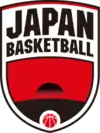 | |||||||||||||||||||||||||
| FIBA ranking | 38 | ||||||||||||||||||||||||
|---|---|---|---|---|---|---|---|---|---|---|---|---|---|---|---|---|---|---|---|---|---|---|---|---|---|
| Joined FIBA | 1936 | ||||||||||||||||||||||||
| FIBA zone | FIBA Asia | ||||||||||||||||||||||||
| National federation | JBA | ||||||||||||||||||||||||
| Coach | Tom Hovasse | ||||||||||||||||||||||||
| Olympic Games | |||||||||||||||||||||||||
| Appearances | 7 | ||||||||||||||||||||||||
| FIBA World Cup | |||||||||||||||||||||||||
| Appearances | 6 | ||||||||||||||||||||||||
| Asian Championships | |||||||||||||||||||||||||
| Appearances | 28 | ||||||||||||||||||||||||
| Medals | |||||||||||||||||||||||||
| Asian Games | |||||||||||||||||||||||||
| Appearances | 16 | ||||||||||||||||||||||||
| Medals | |||||||||||||||||||||||||
|
| |||||||||||||||||||||||||
Medal record
| |||||||||||||||||||||||||
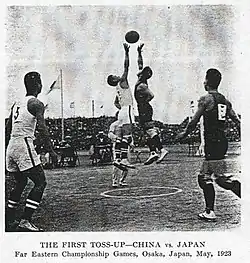

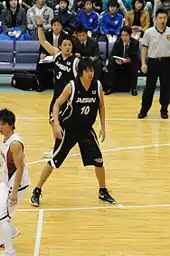
Japan has one of the most successful basketball teams in Asia. It has won the Asian Basketball Championships twice and is the second leading nation in qualifications to the event. The team qualified for the Olympic Games 7 times and for the FIBA World Cup six times.
History
The beginning (1917–1936)
Japan's national team had its first international tournament at the 3rd Far Eastern Games held in Tokyo in 1917, at which Japan was representated by the team of the Kyoto YMCA.
Later, the team was a founding member of the Olympics Basketball competition in Berlin 1936.
Establishment as a competitor at the global stage (1937–1976)
After 1936, Japan Henceforth, they participated almost every time until 1976. Team Japan was a regular at world tournaments. It had its debut at the FIBA World Championship in 1963. It was the top team in Asia, as it won the championship there in 1965 and 1971.
At the 1976 Summer Olympics, Japan's Shigeaki Abe put up a noteworthy performance of 38 points and 10 assists gainst Puerto Rico.[3]
Since the rise of China, Japan declined a little bit and appearances at global events became scarcer.
Continued success (1995–1998)
As runner-up at the Fukuoka Universiade in 1995, Team Nippon (as the Japanese are also called) had a streak of success and qualified for the 1998 FIBA World Championship, its first qualification in over 30 years. Coached by the Croat Željko Pavličević, the team played well but did not make it out of the primary round, where it lost its fourth-place battle against former Semi-finalist New Zealand.
Competition from the Middle East intensifies (1999–2009)
In the late 1990s, Japan played against more intense competition from the Middle East. Combined with many player absences from the team, Team Nippon struggled to win medals at the Asian Championships since its silver medal in 1997. At the 2008 event in their home country (Tokushima), the team finished at the 8th position and missed qualification for both the Beijing Olympic Tournament and qualification to the 2010 FIBA World Championship. At the 2009 FIBA Asia tournament the team sank to No. 10 position, its worst performance. This was partly due to the change of the head coach just before the tournament.
Recovery (2010–present)
Overshadowed by the drawbacks at international competitions, Japan brought forth several of Asia's elite basketball players who competed in the NBA and in Europe. These players included Yuta Tabuse, J.R. Sakuragi, Takuya Kawamura, Takumi Ishizaki and others. However, they rarely played for the national team, which caused Team Japan to fall behind Asia's elite competition from Iran, South Korea, the Philippines and China.
To better the results, the American coach Thomas Wisman took over the management of the team in 2010 and made some considerable improvements. Wisman just came off a phenomenal year in the Japanese Basketball League (JBL) where he had led Tochigi Brex to its first and only national title. At the FIBA Asia Stankovic Cup in 2010, Team Nippon was defeated by host Lebanon but exceeded expectations as it finished as runner-up. At the 2011 FIBA Asia Championship, the listed goal of the Final Four was missed as the team reached the 7th position out of 15. The team managed to defeat finalists Jordan but then lost to South Korea in the first playoff round and was defeated.
In March 2012, the Japan Association dismissed Wissmann and the country's coaching legend Kimikazu Suzuki took over the reins of the team. Suzuki, concurrently coaching the Aisin SeaHorses Mikawa had initial success as Team Nippon finished Runner-up at the next FIBA Asian Cup which was held in Tokyo in September 2012. Aimed at the acquisition of a 2014 FIBA World Cup berth, the team finished the 2013 FIBA Asia Championship at the 9th position where it lost its last three games.
In 2014, Yuta Tabuse and several of Japan's top players returned to the national team and helped to reach its best finish in almost 20 years.
Japan will co-host the 2023 FIBA Basketball World Cup along with Philippines and Indonesia.
Competitive record
Olympic Games
| Year | Position | Tournament | Host |
|---|---|---|---|
| 1936 | 9 | Basketball at the 1936 Summer Olympics | Berlin, Germany |
| 1956 | 10 | Basketball at the 1956 Summer Olympics | Melbourne, Australia |
| 1960 | 15 | Basketball at the 1960 Summer Olympics | Rome, Italy |
| 1964 | 10 | Basketball at the 1964 Summer Olympics | Tokyo, Japan |
| 1972 | 14 | Basketball at the 1972 Summer Olympics | Munich, Germany |
| 1976 | 11 | Basketball at the 1976 Summer Olympics | Montreal, Canada |
| 2020 | 11[4] | Basketball at the 2020 Summer Olympics | Tokyo, Japan |
| 2024 | To be determined | Basketball at the 2024 Summer Olympics | Paris, France |
FIBA Basketball World Cup
| FIBA World Cup Record | |||||
|---|---|---|---|---|---|
| Year | Position | Pld | W | L | |
| 1950–1959 | Did not qualify | ||||
| Preliminary round | 3 | 1 | 2 | ||
| Classification round | 8 | 2 | 6 | ||
| 1970–1994 | Did not qualify | ||||
| Classification round | 5 | 1 | 4 | ||
| Did not qualify | |||||
| Preliminary round | 5 | 1 | 4 | ||
| Did not qualify | |||||
| Preliminary round | 5 | 0 | 5 | ||
| Qualified as co-hosts | |||||
| Total | 26 | 5 | 21 | ||
FIBA Asia Cup
| Year | Position | Pld | W | L |
|---|---|---|---|---|
| 3rd place | 9 | 5 | 4 | |
| Did not enter | ||||
| Champions | 9 | 8 | 1 | |
| 3rd place | 9 | 7 | 2 | |
| Runners-up | 8 | 7 | 1 | |
| Champions | 8 | 8 | 0 | |
| 4th place | 10 | 6 | 4 | |
| Runners-up | 8 | 7 | 1 | |
| 3rd place | 9 | 7 | 2 | |
| Runners-up | 8 | 7 | 1 | |
| 3rd place | 7 | 5 | 2 | |
| Runners-up | 7 | 5 | 2 | |
| 5th place | 6 | 5 | 1 | |
| 3rd place | 8 | 6 | 2 | |
| 4th place | 7 | 4 | 3 | |
| 3rd place | 8 | 5 | 3 | |
| 7th place | 6 | 3 | 3 | |
| 3rd place | 9 | 7 | 2 | |
| Runners-up | 7 | 4 | 3 | |
| 5th place | 7 | 5 | 2 | |
| 6th place | 6 | 2 | 4 | |
| 6th place | 7 | 3 | 4 | |
| 5th place | 8 | 5 | 3 | |
| 8th place | 8 | 4 | 4 | |
| 10th place | 8 | 3 | 5 | |
| 7th place | 9 | 5 | 4 | |
| 9th place | 7 | 3 | 4 | |
| 4th place | 9 | 5 | 4 | |
| 9th place | 4 | 2 | 2 | |
| Qualified | ||||
| Total | 29/30 | 216 | 143 | 73 |
Asian Games
|
East Asian Games
|
Team
2020 Olympic roster
The roster was announced on 5 July 2021.[5]
| Japan national basketball team roster | ||||||||||||||||||||||||||||||||||||||||||||||||||||||||||||||||||||||||||||||||||||||||||||
|---|---|---|---|---|---|---|---|---|---|---|---|---|---|---|---|---|---|---|---|---|---|---|---|---|---|---|---|---|---|---|---|---|---|---|---|---|---|---|---|---|---|---|---|---|---|---|---|---|---|---|---|---|---|---|---|---|---|---|---|---|---|---|---|---|---|---|---|---|---|---|---|---|---|---|---|---|---|---|---|---|---|---|---|---|---|---|---|---|---|---|---|---|
| Players | Coaches | |||||||||||||||||||||||||||||||||||||||||||||||||||||||||||||||||||||||||||||||||||||||||||
|
| |||||||||||||||||||||||||||||||||||||||||||||||||||||||||||||||||||||||||||||||||||||||||||
Depth chart
| Pos. | Starting 5 | Bench 1 | Bench 2 |
|---|---|---|---|
| C | Gavin Edwards | Kosuke Takeuchi | Avi Schafer |
| PF | Rui Hachimura | Joji Takeuchi | |
| SF | Yuta Watanabe | Yudai Baba | |
| SG | Daiki Tanaka | Seiya Ando | Shuto Ando |
| PG | Ryusei Shinoyama | Makoto Hiejima |
Head coaches
 Nobuaki Asano – 1936
Nobuaki Asano – 1936 Keishu Makiyama – 1951–1954
Keishu Makiyama – 1951–1954 Tetsuo Oba – 1954–1956
Tetsuo Oba – 1954–1956 Seiichi Morisawa – 1957–1960
Seiichi Morisawa – 1957–1960 M. Maeda – 1956, 1960
M. Maeda – 1956, 1960 Shiro Yoshii – 1962–1964
Shiro Yoshii – 1962–1964 Marco Antonio de Venetis – 1964
Marco Antonio de Venetis – 1964 Tadashi Miura – 1965
Tadashi Miura – 1965 Shutaro Shoji – 1966
Shutaro Shoji – 1966 Shigeyoshi Kasahara – 1967
Shigeyoshi Kasahara – 1967 Shiro Yoshii – 1967
Shiro Yoshii – 1967 Keishu Makiyama – 1969
Keishu Makiyama – 1969 Shigeyoshi Kasahara – 1970
Shigeyoshi Kasahara – 1970 Kuninaka Taketomi – 1971
Kuninaka Taketomi – 1971 Shigeyoshi Kasahara – 1972–1973
Shigeyoshi Kasahara – 1972–1973 Masahiko Yoshida – 1974–1976
Masahiko Yoshida – 1974–1976 Shigeyoshi Kasahara – 1977
Shigeyoshi Kasahara – 1977 Yoshiaki Shimizu – 1978
Yoshiaki Shimizu – 1978 Tsunetoshi Akiyoshi – 1978–1979
Tsunetoshi Akiyoshi – 1978–1979 Mototaka Kohama – 1979
Mototaka Kohama – 1979 Yoshiaki Shimizu – 1980–1983
Yoshiaki Shimizu – 1980–1983 Mototaka Kohama – 1984–1989
Mototaka Kohama – 1984–1989 Yoshiaki Shimizu – 1990
Yoshiaki Shimizu – 1990 Yoshinori Shimizu – 1991–1994
Yoshinori Shimizu – 1991–1994 James Gordon – 1994
James Gordon – 1994 Toshimitsu Kawachi – 1995–1996
Toshimitsu Kawachi – 1995–1996 Mototaka Kohama – 1996–2000
Mototaka Kohama – 1996–2000 Tom Newell – 2000
Tom Newell – 2000 Kenji Yoshida – 2000–2002
Kenji Yoshida – 2000–2002 Željko Pavličević – 2003–06
Željko Pavličević – 2003–06 Kimikazu Suzuki – 2006–2007
Kimikazu Suzuki – 2006–2007 David Hobbs – 2009
David Hobbs – 2009 Osamu Kuraishi – 2009
Osamu Kuraishi – 2009 Shuji Ono – 2009
Shuji Ono – 2009 Thomas Wisman – 2010–12
Thomas Wisman – 2010–12 Kimikazu Suzuki – 2012–13
Kimikazu Suzuki – 2012–13 Kenji Hasegawa – 2014–2016[7][8]
Kenji Hasegawa – 2014–2016[7][8]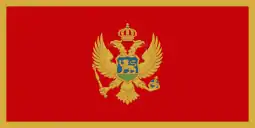 Luka Pavićević – 2016–17[8]
Luka Pavićević – 2016–17[8] Akira Rikukawa – 2017
Akira Rikukawa – 2017 Julio Cesar Lamas[9] – 2017–
Julio Cesar Lamas[9] – 2017–
Past rosters
1936 Olympic Games: finished 13th among 21 teams
Riichi Cho, T.Nakae, S.Ri, K.Yokoyama, T.Kanakogi, M.Maeda, U.Munakata, S.Matsui
1956 Olympic Games: finished 10th among 15 teams
Setsuo Nara, Jose Rodriguez, Kenichi Imaizumi, Hiroshi Saito, Reizo Ohira, Hitoshi Konno, Takashi Itoyama, Manabu Fujita, Takeo Sugiyama, Tetsuro Noborisaka, Riichi Arai (Coach: M.Maeda)
1960 Olympic Games: finished 15th among 16 teams
Setsuo Nara, Shutaro Shoji, Hiroshi Saito, Takashi Itoyama, Takeo Sugiyama, Kenichi Imaizumi, Yasukuni Oshima, Shoji Kamata, Masashi Shiga, Takashi Masuda, Kaoru Wakabayashi, Hideo Kanekawa (Coach: M.Maeda)
1963 World Championship: finished 13th among 13 teams
Setsuo Nara, Takashi Masuda, Masashi Shiga, Yasukuni Oshima, Kaoru Wakabayashi, Keizo Okayama, Isamu Yamaguchi, Yoshikuni Awano, Fumihiko Moroyama, Katsuji Tsunoda, Kunihiko Nakamura, Yoshitaka Egawa (Coach: Shiro Yoshii)
1964 Olympic Games: finished 10th among 16 teams
Takashi Masuda, Setsuo Nara, Masashi Shiga, Kaoru Wakabayashi, Fumihiko Moroyama, Katsuji Tsunoda, Kunihiko Nakamura, Yoshitaka Egawa, Nobuo Kaiho, Akira Kodama, Katsuo Bai, Seiji Fujie (Coach: Marco Antonio de Venetis)
1967 World Championship: finished 11th among 13 teams
Kaoru Wakabayashi, Fumihiko Moroyama, Kunihiko Nakamura, Yoshitaka Egawa, Akira Kodama, Masatomo Taniguchi, Nobuo Hattori, Kenji Soda, Masahiko Yoshida, Isao Kimura, Seiji Igarashi (Coach: Shutaro Shoji)
1972 Olympic Games: finished 14th among 16 teams
Kenji Soda, Masatomo Taniguchi, Nobuo Hattori, Kunihiko Yokoyama, Atsushi Somamoto, Hirofumi Numata, Shigeaki Abe, Mineo Yoshikawa, Kazufumi Sakai, Nobuo Chigusa, Satoshi Mori, Katsuhiko Sugita (Coach: S.Kasahara)
1976 Olympic Games: finished 11th among 12 teams
Hirofumi Numata, Shigeaki Abe, Satoshi Mori, Norihiko Kitahara, Hideki Hamaguchi, Kiyohide Kuwata, Koji Yamamoto, Yutaka Fujimoto, Shigeto Shimizu, Fumio Saito, Nobuo Chigusa, Shoji Yuki (Coach: Masahiko Yoshida)
1998 World Championship: finished 14th among 16 teams
Kenichi Sako, Maikeru Takahashi, Akifumi Yamasaki, Hiroshi Nagano, Makoto Hasegawa, Takehiko Orimo, Satoshi Sakumoto, Hiroyuki Tominaga, Takahiro Setsumasa, Makoto Minamiyama, Takeshi Yuki, Satoru Furuta (Coach: Mototaka Kohama)
2006 World Championship: finished 20th among 24 teams
Takehiko Orimo, Satoru Furuta, Takahiro Setsumasa, Shunsuke Ito, Joji Takeuchi, Kei Igarashi, Shinsuke Kashiwagi, Daiji Yamada, Ryota Sakurai, Kosuke Takeuchi, Takuya Kawamura, Tomoo Amino (Coach: Zeljko Pavlicevic)
Roster for the 2016 FIBA World Olympic Qualifying Tournaments:[10]
| Japan men's national basketball team roster | |||||||||||||||||||||||||||||||||||||||||||||||||||||||||||||||||||||||||||||||||||||||||||
|---|---|---|---|---|---|---|---|---|---|---|---|---|---|---|---|---|---|---|---|---|---|---|---|---|---|---|---|---|---|---|---|---|---|---|---|---|---|---|---|---|---|---|---|---|---|---|---|---|---|---|---|---|---|---|---|---|---|---|---|---|---|---|---|---|---|---|---|---|---|---|---|---|---|---|---|---|---|---|---|---|---|---|---|---|---|---|---|---|---|---|---|
| Players | Coaches | ||||||||||||||||||||||||||||||||||||||||||||||||||||||||||||||||||||||||||||||||||||||||||
}
|
| ||||||||||||||||||||||||||||||||||||||||||||||||||||||||||||||||||||||||||||||||||||||||||
At the 2016 FIBA Asia Challenge.[11]
| Japan men's national basketball team – 2016 FIBA Asia Challenge roster | ||||||||||||||||||||||||||||||||||||||||||||||||||||||||||||||||||||||||||||||||||||||||||||
|---|---|---|---|---|---|---|---|---|---|---|---|---|---|---|---|---|---|---|---|---|---|---|---|---|---|---|---|---|---|---|---|---|---|---|---|---|---|---|---|---|---|---|---|---|---|---|---|---|---|---|---|---|---|---|---|---|---|---|---|---|---|---|---|---|---|---|---|---|---|---|---|---|---|---|---|---|---|---|---|---|---|---|---|---|---|---|---|---|---|---|---|---|
| Players | Coaches | |||||||||||||||||||||||||||||||||||||||||||||||||||||||||||||||||||||||||||||||||||||||||||
}
|
| |||||||||||||||||||||||||||||||||||||||||||||||||||||||||||||||||||||||||||||||||||||||||||
Kit
Manufacturer
2015–2019: Under Armour[12] 2021-: Nike, Inc.[12]
See also
References
- "FIBA Ranking Presented by Nike". FIBA. 1 March 2022. Retrieved 1 March 2022.
- "Profile | FIBA.COM".
- "Yao, Hamed, and Patty shined as stars from Asia & Oceania at the Olympics". FIBA. 21 July 2021. Retrieved 4 August 2021.
- "Japan launch search for new coach after Hasegawa departure". FIBA. 2 December 2016. Retrieved 8 December 2016.
"The JBA is not guaranteed participation in the 2020 Tokyo Olympic Games as the host country and has already begun a restructuring (of the program) and strengthening activities towards the 2019 FIBA World Cup and 2020 and beyond," Higashino said.
- "第32回オリンピック競技大会(2020/東京) 5人制バスケットボール男子日本代表チーム 内定選手12名発表". japanbasketball.jp. Retrieved 5 July 2021.
- "Team Roster Japan" (PDF). olympics.com. Retrieved 24 July 2021.
- "Japan hoops set to hire Hasegawa". The Japan Times. 8 April 2014. Retrieved 23 September 2014.
- "Japan launch search for new coach after Hasegawa departure". FIBA. 2 December 2016. Retrieved 8 December 2016.
- "Basketball: World Cup qualification could prove turning point for Japan". Joel Fitzpatrick/Kyodod News+. 26 February 2019. Retrieved 19 May 2020.
- "Japan select 12 men to chase Olympic dream".
- Japan – FIBA Asia Challenge 2016, FIBA.COM. Retrieved 13 February 2017.
- 2015 FIBA Asia Championship – Japan, FIBA.com. Retrieved 27 September 2015.
- Fiba Asia Cup 2017, FIBA.com. Retrieved 21 August 2017.
External links
- Official website

- FIBA profile
- Japan Basketball Records at FIBA Archive
Videos
- Japan – Highlights – 2015 FIBA Asia Championship Youtube.com video
- Japan Offense Highlights – FIBA Asia Cup 2017 Youtube.com video